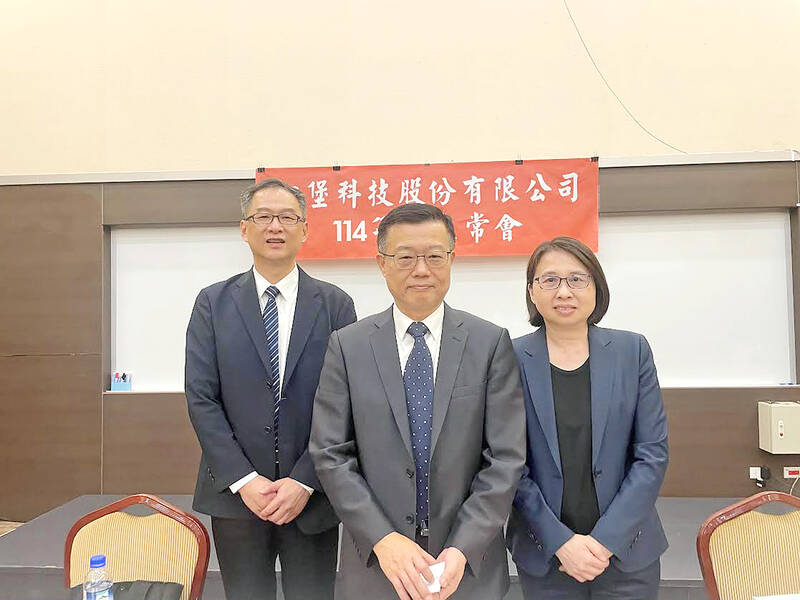Electronic payment terminal maker Castles Technology Co (虹堡科技) yesterday said that the launch of new products this quarter is expected to boost revenue growth in the second half of the year.
Many of its clients — primarily financial institutions and payment service providers — are expected to upgrade to new Android-based smart payment terminals offering enhanced security and greater operational flexibility, the company said in its annual report.
The company’s products mainly comprise mobile point-of-sale devices, electronic funds transfer at point-of-sale terminals and PIN pad terminals, according to its Web site.

Photo: Meryl Kao, Taipei Times
About 95 percent of its revenue comes from overseas, with Europe accounting for the largest share, followed by Japan, Castles Technology chief operating officer Sharon Huang (黃佳華) told reporters after the company’s annual shareholders’ meeting in Taipei.
The equipment upgrade begins this quarter at some key clients such as 7-Eleven operator President Chain Store Corp (統一超商), Taiwan FamilyMart Co Ltd (全家便利商店) and Chunghwa Post Co’s (中華郵政) iBox payment machines, Huang said.
Several banks are expected to adopt the new products after the completion of pilot and verification tests, she said.
At an earnings conference in April, the company said that it had invested heavily in establishing production facilities in Taiwan, including surface-mounted technology assembly lines, amid ongoing trade tension between the US and China.
The assembly lines are operating at about 80 percent of capacity, and the company would consider adding new lines if necessary, Huang said.
Sales from the Latin American market are expected to pick up later this year, while growth in Southeast Asia is likely to be slower, Castles Technology chairman Kevin Hsin (辛華熙) said.
Second-quarter revenue is expected to surpass the first-quarter level, with sales in the third quarter likely to be slightly better than the second, Hsin said, adding that the outlook for the company’s orders and operations over the next two to three years remains positive.
Amid price competition and industry transformation, the company’s strategy is to enhance development capabilities and system integration, and offer flexible pricing solutions tailored to different market segments to meet client needs, he said.
Shareholders yesterday approved the company’s proposal to distribute a cash dividend of NT$2.5 per share, the highest in its history.
Revenue last year dipped 2.73 percent year-on-year to NT$7.8 billion (US$264.1 million), while net profit reached NT$717.39 million, down 22.98 percent year-on-year. Earnings per share were NT$6.35.

Taiwan’s long-term economic competitiveness will hinge not only on national champions like Taiwan Semiconductor Manufacturing Co. (TSMC, 台積電) but also on the widespread adoption of artificial intelligence (AI) and other emerging technologies, a US-based scholar has said. At a lecture in Taipei on Tuesday, Jeffrey Ding, assistant professor of political science at the George Washington University and author of "Technology and the Rise of Great Powers," argued that historical experience shows that general-purpose technologies (GPTs) — such as electricity, computers and now AI — shape long-term economic advantages through their diffusion across the broader economy. "What really matters is not who pioneers

In a high-security Shenzhen laboratory, Chinese scientists have built what Washington has spent years trying to prevent: a prototype of a machine capable of producing the cutting-edge semiconductor chips that power artificial intelligence (AI), smartphones and weapons central to Western military dominance, Reuters has learned. Completed early this year and undergoing testing, the prototype fills nearly an entire factory floor. It was built by a team of former engineers from Dutch semiconductor giant ASML who reverse-engineered the company’s extreme ultraviolet lithography (EUV) machines, according to two people with knowledge of the project. EUV machines sit at the heart of a technological Cold

TAIWAN VALUE CHAIN: Foxtron is to fully own Luxgen following the transaction and it plans to launch a new electric model, the Foxtron Bria, in Taiwan next year Yulon Motor Co (裕隆汽車) yesterday said that its board of directors approved the disposal of its electric vehicle (EV) unit, Luxgen Motor Co (納智捷汽車), to Foxtron Vehicle Technologies Co (鴻華先進) for NT$787.6 million (US$24.98 million). Foxtron, a half-half joint venture between Yulon affiliate Hua-Chuang Automobile Information Technical Center Co (華創車電) and Hon Hai Precision Industry Co (鴻海精密), expects to wrap up the deal in the first quarter of next year. Foxtron would fully own Luxgen following the transaction, including five car distributing companies, outlets and all employees. The deal is subject to the approval of the Fair Trade Commission, Foxtron said. “Foxtron will be

INFLATION CONSIDERATION: The BOJ governor said that it would ‘keep making appropriate decisions’ and would adjust depending on the economy and prices The Bank of Japan (BOJ) yesterday raised its benchmark interest rate to the highest in 30 years and said more increases are in the pipeline if conditions allow, in a sign of growing conviction that it can attain the stable inflation target it has pursued for more than a decade. Bank of Japan Governor Kazuo Ueda’s policy board increased the rate by 0.2 percentage points to 0.75 percent, in a unanimous decision, the bank said in a statement. The central bank cited the rising likelihood of its economic outlook being realized. The rate change was expected by all 50 economists surveyed by Bloomberg. The